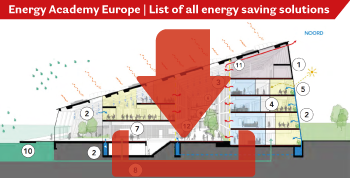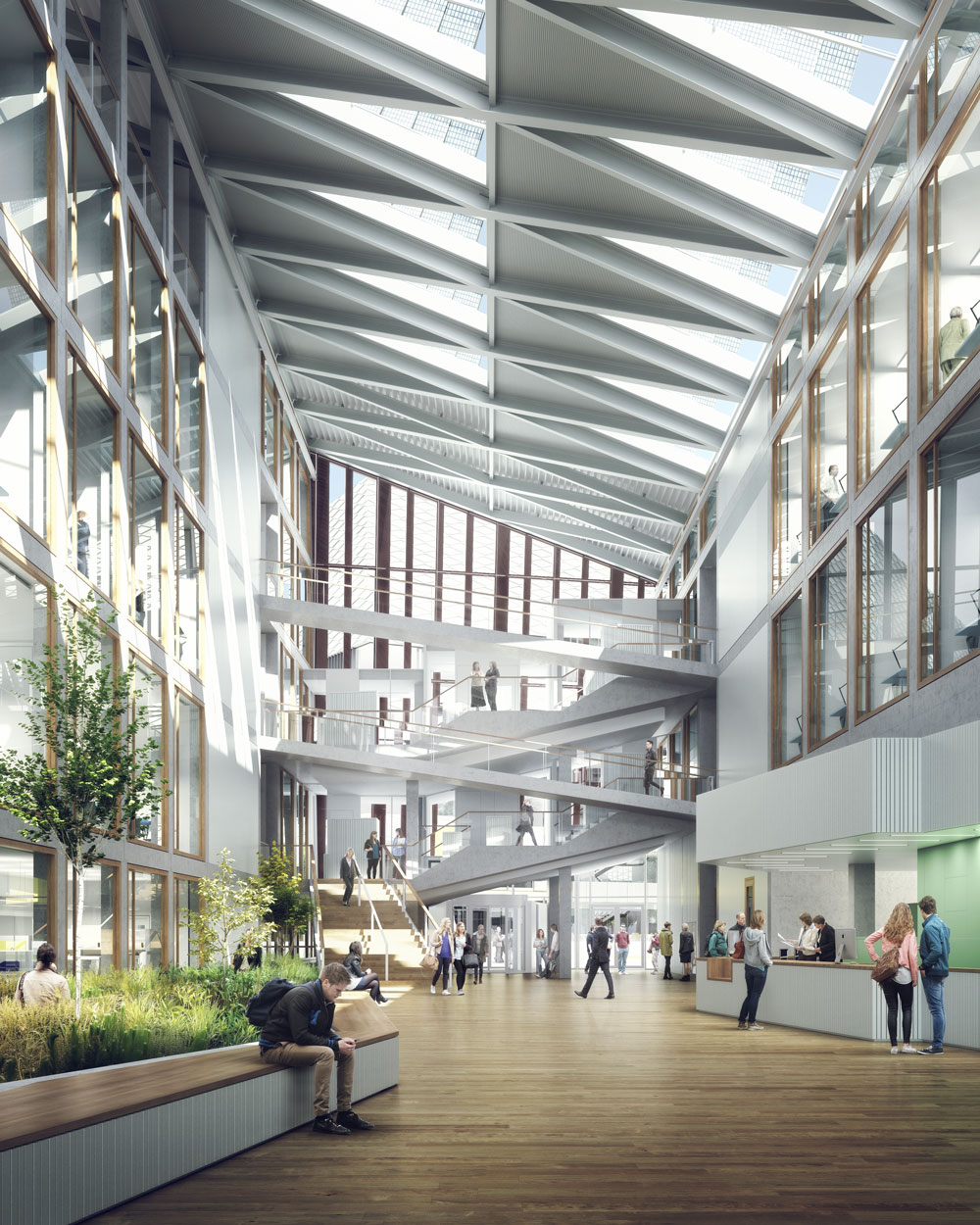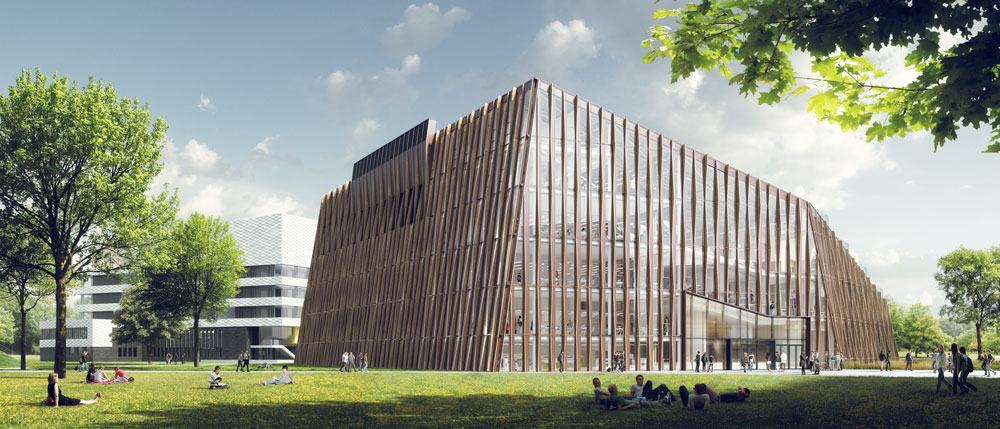Energy Academy Europe
Hij staat:
het duurzaamste onderwijsgebouw van Nederland!
In het ambitieuze gebouw de Energy Academy Europe werken bedrijfsleven, onderwijs en wetenschap samen aan onderzoek en innovatie op energiegebied. Om de extreem duurzame energie-uitgangspunten te kunnen realiseren heeft het een bijzondere bouwvorm met groot zonnepanelendak gekregen. Het bouwwerk van bijna 15.000 m2 met BREEAM-niveau ‘Outstanding’ is in oktober 2016 opgeleverd op de Zernike Campus Groningen.
Natuurlijk en functioneel ontwerp
Het nieuwe gebouw moet een plek zijn waar ontmoeting en kennisuitwisseling centraal staat, dat innovatie en energie uitstraalt en tegelijkertijd natuurlijk aanvoelt. Het unieke ontwerp toont aan hoe een gebouw optimaal gebruik kan maken van de natuurelementen aarde, water, lucht en zonlicht als primaire energiebron. Het schuin oplopende dak met zonnepanelen wordt optimaal ingezet voor de opvang van zonne-energie. De panelen leveren niet alleen veel energie op, maar bieden door slimme plaatsing alle ruimte voor maximale daglichttoetreding. Het gebouw krijgt met deze buitenkant een opvallend uiterlijk dat direct duidelijk maakt dat in dit gebouw op vernieuwende wijze met energie wordt omgegaan.
Het gebouw bestaat grofweg uit twee bouwdelen. Aan de noordzijde komen de onderzoeksruimtes met laboratoria en aanverwante werkruimtes en aan de zuidkant bevinden zich werklandschappen, een wintertuin en onderwijsruimten. Daartussen komen alle werelden samen in een groot ‘energieplein’, het levendige hart van het gebouw.

Ook de met natuurlijk materiaal afgewerkte vloeren verbinden alle delen van het gebouw. Via brede, aantrekkelijke hellingbaantrappen worden gebruikers en bezoekers vrijwel vanzelfsprekend verleid om de trap te gebruiken in plaats van de lift; zo wordt bewegen en ontmoeting gestimuleerd en verbruikt de lift niet onnodig energie.
Een grote wintertuin staat in open verbinding met de rest van het gebouw en kan indien wenselijk afgesloten worden. De wintertuin is zowel openbaar park als pauze- en werkplek.

Slim gebruik maken van de natuur
Voor dit gebouw is gekozen voor een low-tech benadering van het energievraagstuk. Er wordt optimaal gebruik gemaakt van wat in ruime mate voorhanden is: de elementen aarde, water, lucht en zonlicht. In een 200 meter lang luchtkanaal onder het gebouw wordt de aarde gebruikt voor koeling of juist opwarming van lucht en water; regenwater wordt gebruikt als spoelwater voor de toiletten; de ventilatie is natuurlijk en wordt aangejaagd door een ‘zonneschoorsteen’ in de nok van het dak; tot slot wordt zonlicht optimaal gebruikt voor verlichting en voor het opwekken van energie. Als de natuurlijke bronnen tijdelijk niet voldoen, zijn back-upinstallaties voorzien voor verwarming, ventilatie en verlichting. Door de innovatieve omgang met duurzame energiebronnen wordt op lange termijn eveneens flink bespaard op de exploitatielasten.
Uitzonderlijk duurzaam
Met het BREEAM-niveau Outstanding zijn extreem hoge eisen gesteld aan de duurzaamheid van de nieuwbouw. Het gebouw moet dan ook inspireren tot vooruitdenken in energie. De lat ligt zelfs zo hoog dat er in Nederland geen gelijk onderwijsgebouw te vinden is. Het heeft een voorbeeldfunctie voor toekomende nieuwbouwprojecten over de hele wereld. Om deze ambitie te bereiken is een team van experts samengesteld bestaande uit Broekbakema, pvanb architecten, ICS Adviseurs, Arup, Ingenieursbureau Wassenaar en DGMR.

Over Energy Academy Europe
De
Energy Academy Europe
(EAE) in Groningen is een initiatief van de Rijksuniversiteit Groningen, de Hanzehogeschool, GasTerra en Energy Valley. De belangrijkste energiethema's van de EAE zijn de energie van morgen (zoals wind- en zonne-energie), smart grids, energie-efficiency, besparingen en CO2-reductie.
Facts & Figures | Energy Academy building
| BREEAM-nl score | Outstanding (lees meer) 89,62% punten |
| Brutovloeroppervlak in m2 (NEN 2580) | 14.819 m2 |
| Totaal terreinoppervlak in hectare | 4.350 m2 |
|
Vloeroppervlakken naar functie en afmetingen (NEN 2580) a) Bijeenkomstfunctie |
|
| Verwacht energiegebruik in kWh / m2 BVO | -12,6 kWh / m2 BVO / jaar elektrisch |
| Verwacht verbruik van fossiele brandstoffen in kWh / m2 BVO / jaar | 0 kWh-elektrisch / m2 BVO / jaar |
| Verwacht verbruik van duurzame energiebronnen in kWh / m2 BVO |
PV-panelen: 64 kWh primair / m2 BVO / jaar WKO: 13 kWh primair / m2 BVO / jaar |
| Verwacht waterverbruik in m3 / persoon / jaar | 7,1 m3 / persoon / jaar |
| Verwacht % van het waterverbruik dat wordt betrokken via hemelwater of grijs water | 29% |

____________________________
Groundbreaking Work
@University of Groningen
| Laatst gewijzigd: | 04 november 2024 12:35 |

